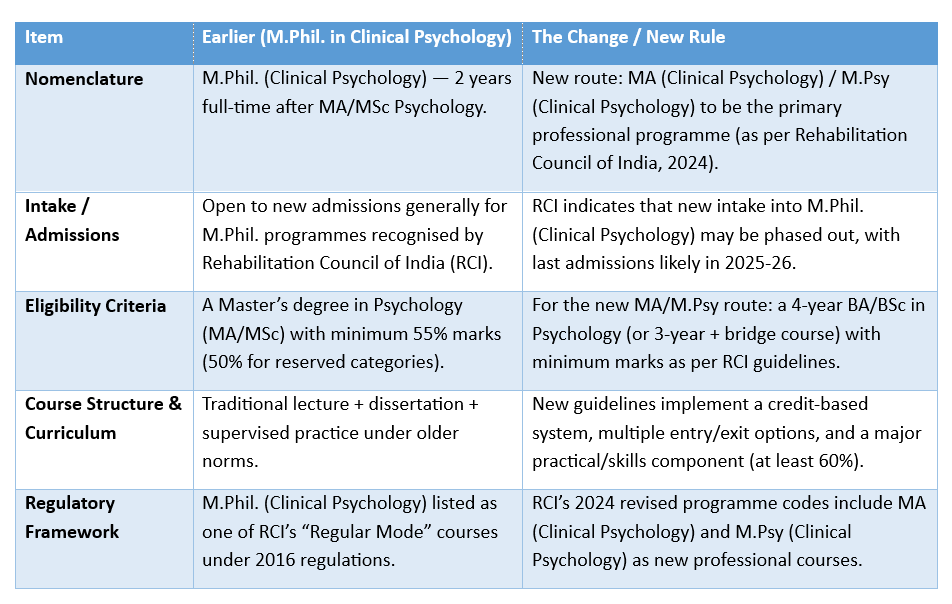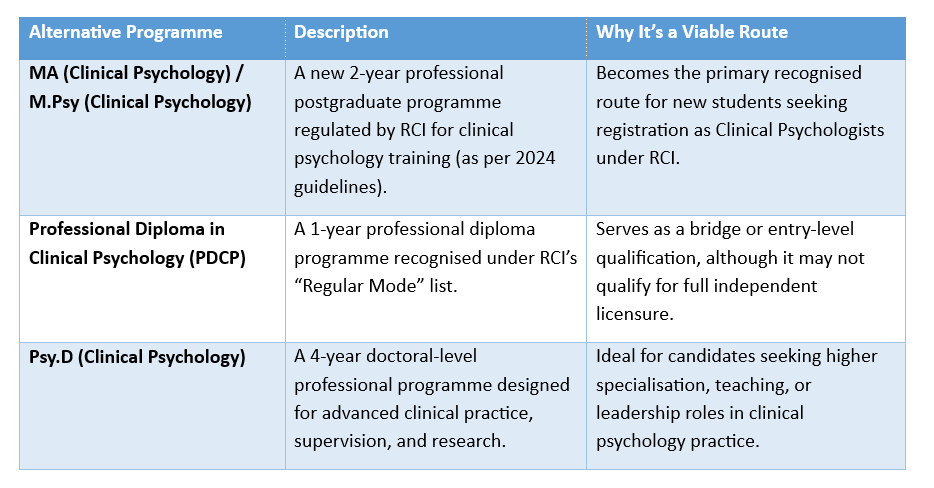Introduction
The field of clinical psychology education in India is undergoing major regulatory and structural change. Historically, the two-year M.Phil in Clinical Psychology (under the aegis of the Rehabilitation Council of India — RCI) has served as the primary professional qualification to become a licensed clinical psychologist. But with the enactment of the National Education Policy 2020 (NEP 2020) and new regulatory guidelines, the system is being restructured. The following article explains: (1) what the old rules were; (2) what the changes are; (3) how they will affect students and institutions; and (4) what alternatives or pathways are being proposed.
Read More: Abnormal Psychology
The Old Structure
Under the earlier regime:
- The M.Phil in Clinical Psychology was a 2-year full-time, hospital-based program recognised by RCI.
- Eligibility typically required a Master’s degree in Psychology (MA/MSc) with a certain percentage (often ~55%) from a UGC-recognised institution.
- After successful completion, graduates could register with RCI as “Clinical Psychologist” (as per licensing norms).
- The program combined theoretical work, supervised clinical practicum/assessment, and a research/dissertation component.
- It aligned with a “3 + 2 + 2” pattern: 3-year bachelor’s (in psychology) + 2-year master’s + 2-year M.Phil, although many institutions also admitted from 4-year bachelor’s + master’s, etc.
This system served for years as the accepted route to professional practice.
Why Change? The Rationale behind the Reform
Several factors are driving the reform:
- The NEP 2020 emphasises a re-structuring of higher education: e.g., a 4-year multidisciplinary bachelor’s degree, flexibility, multiple exit options, and phase-out of M.Phil in many domains.
- The M.Phil route was seen by some critics as elongated, less aligned with professional competencies and clinical immersion compared to what may be needed given India’s mental-health workforce gap.
- The RCI and allied regulatory bodies recommended updating training frameworks, curricula, nomenclature, entry eligibility and pathways to better match international norms and clinical demands.
- A transition plan is felt necessary to ensure continuous supply of trained clinical psychologists and prevent a gap in workforce.
The Key Changes
Below are the major changes introduced or announced in relation to the M.Phil in Clinical Psychology and associated pathways:
Discontinuation of the M.Phil route (as recognised by RCI)
- It has been proposed that the M.Phil in Clinical Psychology will be discontinued as the standard pathway for eligibility for registration under RCI.
- The new regulatory guideline document by RCI states that the new “MA (Clinical Psychology)” programme will replace the M.Phil – effective from academic session 2025-26.
- Students already enrolled in M.Phil programs may be allowed to complete under transitional provisions, but no new admissions (or gradually phasing out) of M.Phil may be permitted.
New entry eligibility & undergraduate structure
- A 4-year professional honours bachelor’s degree (e.g., B.Sc. (Hons) Clinical Psychology) is being proposed for direct entry into clinical psychology training.
- Alternatively, for students with existing 3-year bachelor’s degrees, a “bridge” or conversion year may be required to make them eligible for the new professional route.
- Eligibility for the new MA (Clinical Psychology) route is being limited to those with an undergraduate psychology qualification (either 4-year honours or 3-year + bridge/PG-year).
New postgraduate nomenclature and programme
- The new qualification proposed is an MA (Clinical Psychology) of 2 years, regulated by RCI, replacing the M.Phil.
- The program will emphasise more practical training, clinical immersion, and competency-based curricula from early phases (including undergraduate years) rather than just postgraduate.
Revised training duration and structure
- One model proposed: 4-year bachelor’s (Hons) + 2-year master’s (MA Clinical Psychology), total 6 years. This is shorter than the earlier 7-year “3 + 2 + 2” model (assuming 3-year bachelor’s + 2-year master’s + 2-year M.Phil).
- Clinical/practical training will begin earlier (in 4th year of undergraduate for general academic track, or from first year for honours track) as per the recommendations.
Regulatory authority and curriculum adjustments
- The regulatory authority for the new track remains RCI (for clinical psychology), but for allied health profession track (common with allied professions) oversight may involve the National Commission for Allied and Healthcare Professions (NCAHP).
- Serous emphasis on competency-based education, emphasis on clinical practicum (OPD/IPD-based), hospital/mental-health-institution linkages for training.
Transition and timeline
- The committee minutes (August 2023) recommended implementation of the new pathways starting from academic session 2024 (or as soon as infrastructure/training capacity is ready). Scribd
- M.Phil programmes may continue during a transition period (e.g., 5 years) to avoid disruption of workforce pipeline

Changes Under NEP
Implications for Students, Institutions and the Profession
For Students
- If you are planning to become a clinical psychologist via RCI registration, you need to check which pathway your institution is offering and whether it is RCI-recognised under the new rules.
- Undergraduate choices matter more now: a 4-year honours in psychology would give more straightforward access to the new MA (Clinical Psychology) route.
- If you have a 3-year bachelor’s in psychology, you may need a bridge year or conversion course to become eligible.
- If you already have entered or completed an M.Phil in Clinical Psychology before cutoff, you may still be eligible for registration—but the pathway may be phased out for new admissions.
- Time to professional qualification may reduce (6 years instead of 7), but competition and regulated seats may remain stringent due to training capacity constraints.
- Non-psychology undergraduates interested in clinical psychology may face increased hurdles for eligibility under the new regime.
For Institutions
- Colleges/universities will need to redesign curricula, obtain regulatory approval (RCI/NCAHP), set up first-year clinical exposure, and coordinate with hospitals/mental health settings for practicum.
- Existing M.Phil programmes must plan a transition strategy: winding down, shifting to MA Clinical Psychology or setting up honours/bridge courses.
- Institutions must ensure training capacity (supervisors, clinical cases, hospital tie-ups) meets competency-based requirements.
For the Profession & Workforce
- The reform aims to produce more practice-ready clinical psychologists with earlier exposure to clinical work, thereby addressing the gap in mental health professionals.
- On the flip side, there may be short-term disruption: fewer seats, transition confusion, and potential drop in intake if institutions lag in regulatory conversion.
- The emphasis on bachelor’s plus master’s track may open up the profession earlier, but also raises questions as to whether quality and supervision will remain high.
Alternatives / Pathways Besides the Traditional M.Phil
Since the M.Phil route is being phased out, several alternative pathways are being proposed or already in place:
- The new MA (Clinical Psychology) route (4-year honours bachelor’s + 2-year MA) is the primary alternative.
- For students with non-psychology undergraduate degrees, there may be a route via a Master’s in psychology (MA/MSc) and then the new MA Clinical Psychology, though eligibility may be more restrictive.
- Some professional diplomas, Psy.D programmes, or PG Diplomas in Clinical Psychology might remain (or be developed) as alternate shorter training routes (though these may not lead to full RCI registration as clinical psychologist).
- For those who want to specialise further or pursue research/academia, PhD routes remain open after the new MA.

Alternatives
What Should Prospective Students Do?
- Check that the programme you apply to is RCI-recognized for clinical psychology (or approved under the new scheme).
- Choose institutions offering the 4-year honours (B.Sc. Hons) in Psychology if you are beginning from undergraduate level.
- If you already have a 3-year bachelor’s in Psychology, look for institutions offering the required “bridge” or conversion year to make you eligible.
- Confirm the curriculum includes adequate supervised clinical practicum, hospital/clinic linkages, and that the training is full-time (not distance/online) because clinical psychology demands hands-on work.
- If you are already enrolled in a current M.Phil programme, check the transition policy, your eligibility for registration, and whether your institution is covered under transitional rules.
- For students without psychology undergraduate background but interested in clinical psychology, consider whether your institution has a clear eligibility route and what limitations there may be.
Potential Challenges and Considerations
- The transition may create confusion and bottlenecks — e.g., seats for new MA Clinical Psychology programmes may be fewer initially.
- Institutions may take time to obtain approvals and build adequate practicum/hospital linkages.
- Students from non-traditional backgrounds (e.g., non-psychology undergrad) may face constrained eligibility.
- The mental health workforce shortage remains pressing — the reforms aim to address it but whether they will deliver in time remains to be seen.
- Quality assurance: more programmes and shorter duration could risk dilution of clinical training unless standards are strictly maintained.
Conclusion
In summary, the landscape of clinical psychology training in India is changing significantly. The longstanding route via the M.Phil in Clinical Psychology is being phased out (for new entrants) and replaced by a newer, more integrated and competency-based route: a 4-year honours bachelor’s + 2-year MA (Clinical Psychology), regulated by RCI (and allied bodies) and aligned with NEP 2020. Prospective students and institutions must stay informed of timelines, eligibility changes, regulatory recognitions, and transition provisions. While the reform holds promise to produce more practice-ready clinical psychologists faster, successful implementation will depend on institutional readiness, regulatory oversight, and capacity to maintain training quality.
References
Rehabilitation Council of India. “Master of Arts in Clinical Psychology: Guidelines for curriculum and training” (PDF). Available at: https://rehabcouncil.nic.in/sites/default/files/revised-prog/MA_Clinical_Psychology%20Guidelines.pdf
UPS Education. “RCI Guidelines on MPhil Clinical Psychology Course” (13 Mar 2024). Available at: https://www.upseducation.in/update/rci-guidelines-on-mphil-clinical-psychology-course/ Ups Education
Indian Counselling Services. “RCI New Guidelines for Clinical Psychologists: 2025 Update” (9 Jun 2025). Available at: https://www.indiancounsellingservices.com/blog/rci-new-guidelines/ Indian Counselling Services
Prakash, O. “Reconsidering the discontinuation of M.Phil. programmes in Clinical Psychology and Psychiatric Social Work: An imperative for India’s mental-health future.” Indian Journal of Psychiatry 66:199-201, 2024. (View via PMC).
Niwlikar, B. A. (2025, November 7). Rule Changes in M.Phil in Clinical Psychology and 4 Important Alternatives to It. Careershodh. https://www.careershodh.com/m-phil-in-clinical-psychology/
